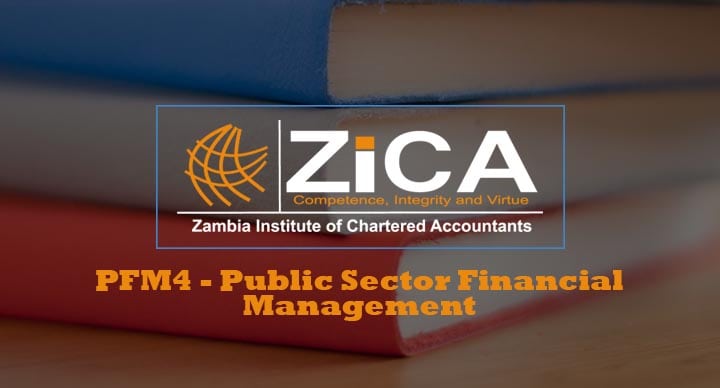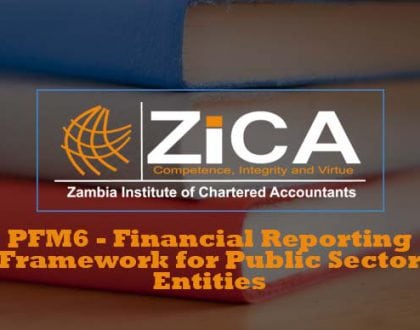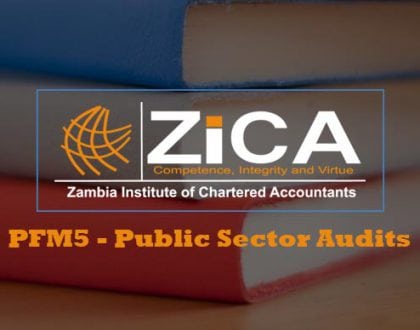PFM4 – Public Sector Financial Management
No access plans exist.

Course Features
Course Details
PFM 4: PUBLIC SECTOR FINANCIAL MANAGEMENT
4.4.1. LEARNING OUTCOMES OF THE COURSE Upon successful completion of this course, a student should be able to:- Explain the principles of Public Finance and Economics that relate to Public Budgeting and the budgetary process;
- Demonstrate knowledge of the budget preparation process;
- Explain how government sources funds;
- Undertake investment appraisals of a project; and
- Outline various Financial Management activities.
| Unit | Title | Weight % |
| 1 | Principles of Public Finance | 10 |
| 2 | Budget Preparation Process | 10 |
| 3 | The role of Financial Management in the Public Sector | 10 |
| 4 | Public Sector Financing | 15 |
| 5 | Investment Appraisal in Public Sector | 15 |
| 6 | Treasury Management activities in Public Sector | 15 |
| 7 | Risk Management Concepts | 10 |
| 8 | Performance Management in the Public Sector | 10 |
| 9 | Public Sector Financial Management Reforms | 5 |
4.4.3. COURSE CONTENT
UNIT 1: PRINCIPLES OF PUBLIC FINANCE Unit Topic:- 1.1 Public Finance
- 1.1.1 Economic theory and the Role of Government in the Economy
- 1.1.2 Market failures
- 1.1.3 Public Goods
- 1.1.4 Externalities
- 2.1 Budgetary theory
- 2.1.1 Budgetary theory and Practice
- 2.1.2 Legal and institutional frameworks in budgeting
- 2.1.3 The Budgetary Process and logic
- 2.1.4 Functions of the Budgetary Process
- 2.2 The Budget Cycle
- 2.2.1 The Government Budget Process
- 2.2.2 Supplementary Budgets
- 2.2.3 Budget Deficits and Balanced Budget Requirements
- 2.3 Operating Budgets
- 2.3.1 Budgeting methods
- 2.3.2 Analyzing Budget Requests
- 2.3.3 Budget Balancing Techniques
- 2.3.4 Budget execution
- 2.4 Capital Budgeting
- 2.4.1 Rationale for Capital Budgeting
- 2.4.2 Capital Budgeting Process
- 2.4.3 Determining Costs
- 2.4.4 Investment Decisions
- 2.4.5 Cost Benefit Analysis
- 3.1 The Public Sector Financial Management and its Stakeholders
- 3.2 Role of Accountant in Public Sector Financial Management
- 3.2.1 Asset Stewardship
- 3.2.2 Debt Management
- 3.2.3 Internal Controls and systems management
- 3.2.4 Risk Management
- 3.3 The Financial system and Government’s role
- 3.4 Financial Management as a function
- 4.1 Sources of finance
- 4.1.1 Non Tax Revenue
- 4.1.2 Tax Revenue
- 4.1.3 Borrowings
- 4.1.4 Grants
- 4.1.5 Exceptional Revenue
- 4.2 Financial Structure of Public Entities
- 4.3 Financing Options for Public Sector Entities
- 5.1 Investment and financing plans
- 5.2 Revenue and Capital expenditure
- 5.3 Importance of non financial factors in capital expenditure decision making
- 5.4 Cashflow, benefits, risk identification and risk attitude
- 5.5 Funding options and financial structure
- 5.6 Investment Appraisal Techniques:
- 5.6.1 Payback Period
- 5.6.2 Net Present Value (NPV)
- 5.6.3 Accounting Rate of Return (AAR)
- 5.6.4 Internal Rate of Return (IRR)
- 5.7 Analysis of Capital Expenditure Decision Making
- 5.7.1 Weighted benefit criteria
- 5.7.2 Cost benefit analysis
- 5.7.3 Cost effectiveness studies
- 5.8 Measurement of Risk on Capital Expenditure Decisions
- 5.8.1 Simulation
- 5.8.2 Sensitivity Analysis
- 6.1 Cash Resource Management
- 6.2 Asset and Liability Management (Maturity Matching)
- 6.3 Investment and Debt Management
- 6.4 Banking Services
- 7.1 Risk Management framework
- 7.2 Different types of risks in the public sector
- 7.3 Types of risk management tools
- 7.4 Application Risk Management tools
- 8.1 Performance Management in the Public Sector
- 8.2 Theory of Performance Management
- 8.3 Indicators of Performance Management in the Public Sector
- 8.4 Evaluating Public Sector Performance
- 9.1 Scope and focus of Public Sector Financial Management Reforms.
- 9.2 Assessment of Public Sector Financial Management Performance.
- 9.3 Factors impacting on Public Sector Financial Management Reforms.
| Structure of the Paper | Marks |
| Section A: 1 Compulsory question of 40 marks | 40 |
| Section B: Any 3 out of 4 questions, 20 marks each | 60 |
| TOTAL | 100 |
This course does not have any sections.





